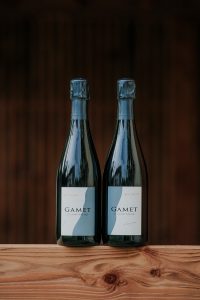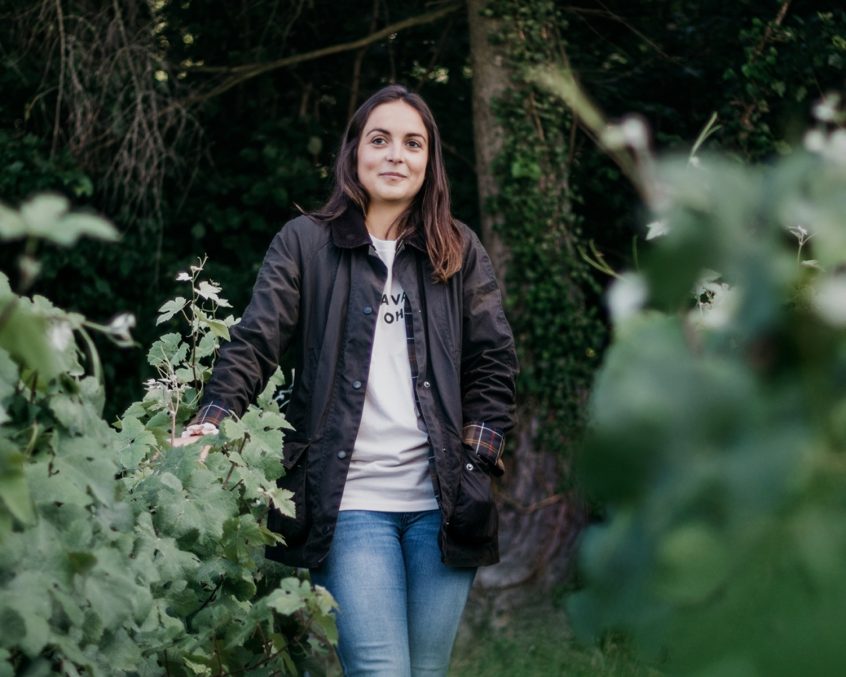Maison Gamet have been producing Champagne in the Marne Valley since 1920, with the same family maintaining control all this time. So it is very much a family affair, with Marianne and Jean-Francois Gamet joining in 2018, taking the reins from their parents. Today the two generations work together to combine tradition and modernity, wisdom and ambition.
Here at Nickolls & Perks, we are proud to have been working directly with Maison Gamet for over 5 years, and we are hopeful that this relationship will continue for years to come. They create a truly excellent range of Champagne, with real character and impressive value for money.
We were thrilled to chat with Marianne Gamet, and hear more about her experience growing up in Champagne, her ethos surrounding production, and the exciting plans in the works for the future of Gamet.
Q: Can you give our readers a quick introduction to your estate, what you stand for and a bit about the wines you produce?
A: I’m Marianne Gamet, and my brother is Jean François Gamet. We took over the estate in 2018. Before that, the estate was led by our parents, and before that by our grandparents. We came back more or less straight after completing our studies. Jean-François is oenologist, and I am more focused on leading the estate in general.
We own and work on 8.60 hectares, split across three different villages: Mardeuil, Damery and Fleury la Rivière, all located in the Vallée de la Marne. Our parents and grand-parents mainly planted Meunier (about 80% of our surface) which is the local grape variety in our area. Our vineyard is 50 years old in average, treated with a sustainable philosophy, limiting our environmental impact by maintaining the land and preserving the biodiversity. We believe that in order to make a good wine, we first need high quality grapes. The most important part of our job, starts in the vineyard. Then, at the winery, the vinification starts. All our wines are made by natural fermentation, and have been since 2018, coming from pied de cuve, elaborated by terroir (right bank, left bank, or by each single vineyard). We allow malolactic fermentation for all our wines, and we work with low levels of sulphites. The wines are aged on lees, vinified and aged in oak barrels or in stainless steel vats. The bottles will then age in the cellar for a period of 20 months-6 years, before we release.
Q: What are your earliest memories of working as part of the estate? Did you always know you wanted to be involved in wine production?
A: My first memory was the 2018 vintage, the first official vintage with my brother. Before 2018, I was still unsure about working for the family estate, but naturally I decided to come back and work alongside my brother.
When you realise that you have the chance to take over an estate, the heritage of your family, and work in an industry which you are passionate about, the choice is easy. I would also say that even if we didn’t always think about returning to the estate, it happened naturally because we spent our entire childhood and adolescence on our parents’ estate, so that’s what we had become accustomed to.
Q: Can you tell us a bit about what your day-to-day looks like now at Gamet?
Every day is different. We work according to the season & according to the weather. A day at the estate always start at 8 am, but you never know when it will finish!
I would say that, we try every day to take a coffee time in family in the morning, which is the moment we talk about the different ongoing subjects and projects.
Otherwise, every day is very different from working in the cellar, preparing orders, welcoming clients, working in the vineyard, in the orchards…
Q: What is the biggest obstacle you have to overcome in producing wine?
We have to be more and more adaptable face to the climate change and to anticipate the future. In general, the temperatures over the year are warmer than before in Champagne, making changes bit-by-bit to our practices in the vineyard, and the seasonality of the work. The other challenge is vintage variation. For some vintages, we have great ripeness, but less acidity. We are planning to replant older variety of grapes like Petit Meslier, Arbane, to bring more natural acidity into our blend and to anticipate the lack of acidity we will face in the future in Champagne.
Q: What part of the winemaking process do you enjoy the most?
The harvest; choosing the right time to harvest and find the perfect balance between the maturity and the acidity. I also love the moment of the fermentation, this is truly magic. The flavors and atmosphere that emerge in the cellar at this moment are simply astounding.
Q: One of my personal favourites from your portfolio is the Caracteres, can you tell us a bit about how you make this Champagne, and what makes it unique?
This is a champagne which had been created and vinified by our father. It is a blend of 50% from the wine of the year (currently 2017), blended with 50% of reserve wines coming from a perpetual reserve that our father started in 1999. This cuvée is the champagne which best represents our estate, highlighting the memories of the harvests as well as the grape varieties which we have in the vineyard. The blend is approximately 80% Meunier, 15% Pinot Noir & 5% Chardonnay.
This cuvée has something special, it is a champagne with a lot of depth that gives emotion when you taste it.
Q: Is there a food and Champagne pairing you live which might surprise people?
The Caracteres will go perfectly with an autumn recipes like a mushroom risotto, or with butternut squash; it also goes really well with bold, umami flavours, like a Japanese ramen!
Q: If you’re not drinking Champagne, what are you drinking?
Cider! We are also a cider producer, since 2020, and we love to experiment new recipes. This is a new and exciting project we have launched – and even if we are still drinking more Champagne at the estate, the cider has a special place in our daily life. This is an easy and savoury beverage to enjoy. After a long day of work in the summertime, a cider is really appreciated by our team.
Q: If you could share a bottle of your Champagne with anyone, living or dead, who would it be?
For me, it would be my grandfather on my mother side, whom I didn’t know very well since he passed away when I was a child. He was also champagne grower, and I would be very grateful and curious to discuss with him his vision of champagne, all discover his knowledge about the terroir of Fleury la Rivière. He was down-to-earth but had great ambitions for his estate. He worked with passion, while committing himself to the region and his village. He was an ambassador for his village.
Otherwise I’m always grateful to share a bottle with my friends and family, which is my favourite moment of every week!
Q: What have been the biggest changes at Gamet under your leadership?
When we came back with my brother in 2018, we did make a lot of changes:
- We changed the branding (labels, logo, etc.), bringing more modernity, and our personal DNA to the house.
- We changed our practices in the vineyard, moving closer to organic, at least to have a sustainable viticulture.
- We changed our practices in the vinification, to highlight more, and respect the terroir of the Vallée de la Marne.
But at the estate, things are always changing. We believe that we should never stop trying to evolve our practices, we are focused on adapting our work, and continuing to learn new things every day!
Q: How do you see the future for Gamet? What are your next steps?
The future of Maison Gamet will involve striving to be more sustainable, evolving with the family philosophy, highlighting the beauty of the Champagne from the Vallée de la Marne, with a premium quality but for an affordable price. We also believe in the diversification of our activities, such as the cider for example, so this is a keen focus for us.
We would love to develop more the hospitality part, so we can offer more experiences to people who are visiting Champagne. We believe that this is important, as young champagne growers, to share our passion and our savoir-faire with the people who are trying to learn more about the complexity of this region.
We also hope to move closer and closer to an organic model to fit with our values.
We are so grateful to have had the opportunity to gain this deeper insight from Marianne about the history, philosophy, and future of Maison Gamet, as well as her thoughtful perspective on the Champagne region as a whole. It’s always inspiring to hear directly from the people behind such remarkable wines – those who balance tradition and innovation with such care.
The wines of Maison Gamet continue to captivate our fine wine team for their diversity, authenticity, and elegant expression of terroir. Each cuvée tells a story of place, family, and craftsmanship, making them firm favourites in our collection. We look forward to following Marianne and the team’s journey as they continue to produce wines that embody both the spirit of their heritage and the vibrancy of modern Champagne.
If you haven’t yet explored the range from Maison Gamet, we can’t recommend them highly enough
You can view the Gamet portfolio on our website via this link.


